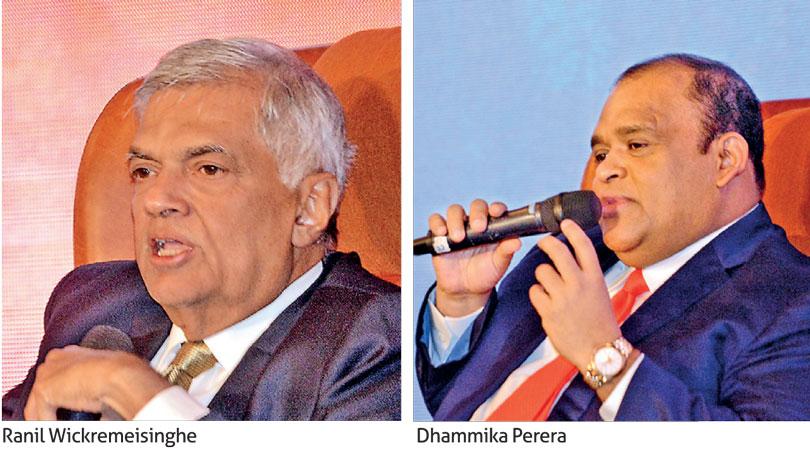22 Mar 2019 - {{hitsCtrl.values.hits}}

By Nishel Fernando
Billionaire businessman and corporate leader Dhammika Perera told a recent forum in Colombo that the government must prioritise economic growth focussing on employment generation, contradicting the Prime Minister Ranil Wickremesinghe and his government’s viewpoint that the government must prioritise fiscal consolidation to stabilise the economy in order to escape middle-income trap.
Perera advised the government to introduce tax incentives, which support new employment generation similar to the United States, to accelerate the country’s sluggish economic growth. However Wickremesinghe stood his ground and asserted that stabilising of the economy with fiscal consolidation was crucial before shifting the focus to economic growth.
These views were shared at the Fireside Chat 2019, co-organised by the International Chamber of Commerce of Sri Lanka, CIMA Sri Lanka and the Daily FT newspaper, last Tuesday,
in Colombo.
Perera insisted that policies aimed at high economic growth will help Sri Lanka in foreign debt repayments as well as to escape the middle-income trap.
According to him, Sri Lanka needs to create additional 120,000 new jobs per annum to reach the anticipated high economic growth to become a high income country with over US $12,000 per capita income.
“We need to brand the nation. We need to bring productivity and innovation. We need start-ups, SMEs and informal sector to support for large industries. In the meantime, we also need to ensure food security by backing the agriculture sector. Social empowerment and poverty reduction programmees should also be implemented,” he stressed.
Perera warned that unless the government employs such measures, it will take more than 100 years to become a high income country as the per capita during last few years had increased only by US $50 per annum.
Defending the government’s policy decisions, Premier Wickremesinghe pointed out that as a large portion of the country’s debt is in foreign currency, unlike in the past, the government had to get its budget in order before focusing on economic growth. .The sharp depreciation of the rupee against the US dollar exacerbated the situation, he said.
“This is why you have to get your budget in order before other changes take place. It’s not a very pleasant thing, but unfortunately this is the medicine we had to take for the illnesses we got ourselves into,” he said.
As the government has made notable progress in its fiscal consolidation efforts by recording a primary account surplus in the past two years as well as anticipated positive balance in the current account, Wickremesinghe said the government has begun taking steps to fuel economic growth in next five years by transforming the economy.
He noted that the fiscal consolidation programme will continue along with the economic transformation aiming to bring down Sri Lanka’s debt to GDP ratio between 55-60 percent by 2030.
“It’s a complete change that is taking place, but it has to be fuelled by the private sector. We are looking at tax incentives and revising some tax incentives, because people have to invest and new sectors have to emerge. “We will see heavy automation taking place in next five years in the state sector. We have to create more work,” he said.
Wickremesinghe further pointed out that without fiscal consolidation, the private sector would have been worse off today.“Where had we been if we didn’t increase the revenue? Where had we been if we didn’t get the primary balances? The business would have been worse off. Our economy is working and that is why we are having positive balances. Hold on to it for a year or two and you will see how the investments will come,” he said.
However, while appreciating the feedback and criticism from the private sector, Wickremesinghe urged the private sector not to fear competition.
“The private sector must complain, if you don’t complain, then you are not the private sector and you will be complacent like the State sector. But, you have to learn to compete with the world, I know you can succeed,” he said.
15 Nov 2024 1 hours ago
15 Nov 2024 2 hours ago
15 Nov 2024 3 hours ago
15 Nov 2024 3 hours ago
15 Nov 2024 4 hours ago